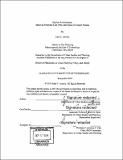Shadow suburbanism : Mexican everyday life, fear, and space in Greater Atlanta
Author(s)
Arroyo, John C. (John Christopher)
Download1418760829-MIT.pdf (65.35Mb)
Alternative title
Mexican everyday life, fear, and space in Greater Atlanta
Other Contributors
Massachusetts Institute of Technology. Department of Urban Studies and Planning.
Advisor
Brent D. Ryan.
Terms of use
Metadata
Show full item recordAbstract
Historical, traditional patterns of U.S. migration locate Mexican immigrants and Mexican- Americans in dense urban centers, but recent, rapid demographic shifts reveal suburbs and exurbs - specifically in the South - as the new host destinations for Mexican settlement. This critical "Latinization" phenomenon is evident by highly visible changes to the built environment, as well as in the ways municipal planning and law enforcement agencies adjust their policies to either accommodate or discriminate against Mexican immigrant land uses. My dissertation broadly examines how fear and invisibility influence Mexicans' spatial coping mechanisms and agentic strategies in suburban Atlanta (Gwinnett County) -- one of the fastest developing and multiethnic metropolitan counties in the country. I ask what constraints and/or opportunities do Mexican populations encounter when attempting to reshape transportation networks, housing, and commercial centers and in recent high-growth U.S. immigrant gateways to fit their needs? Where is this transformation occurring, and why? How do they hold meaning, and what is that meaning to Mexican populations in a culture of anti-immigrant fear and tension? A case-study approach is supplemented with data triangulated from 145 in-depth interviews; participant observation; and longitudinal (1996-2018) content analysis of material from English and Spanish-language news media, community organizations, and federal, state, and municipal policy documents. My project extends the literature on the contributions and integration challenges of Mexicans in new immigrant destinations in both planning and sociology. It provides an empirical basis to analyze the culture of fear and resulting interiorization through the lens of Latino Urbanism scholarship while simultaneously situating migration theory across multiple spaces and places, based on the experiences of the largest Latinx minority group in the U.S. I argue that despite an era of pervasive fear and heightened tensions surrounding Mexican communities under the Trump administration, suburbs provide Mexicans flexible opportunities to assert their identity. The dissertation concludes by drawing on Kevin Lynch's Good City Form (1981) and the ideals of immigrant placemaking to propose a theory of "suburban spatial fit" for ethnically diverse suburbs. Where Mexican immigrants live in the U.S. plays a critical role in how they adapt to their host society -- and how their host society reacts to their presence in a policy context. In a 2 1st century America defined by exponential Latinx growth and evolving debates about immigration federalism, the case of Gwinnett County illustrates the role of the built environment as both agent and canvas for Latinx expressions of cultural self.
Description
Thesis: Ph. D. in Urban Planning, Policy, and Design, Massachusetts Institute of Technology, Department of Urban Studies and Planning, 2018 Cataloged from the official PDF of thesis. Includes bibliographical references (pages 436-459).
Date issued
2018Department
Massachusetts Institute of Technology. Department of Urban Studies and PlanningPublisher
Massachusetts Institute of Technology
Keywords
Urban Studies and Planning.